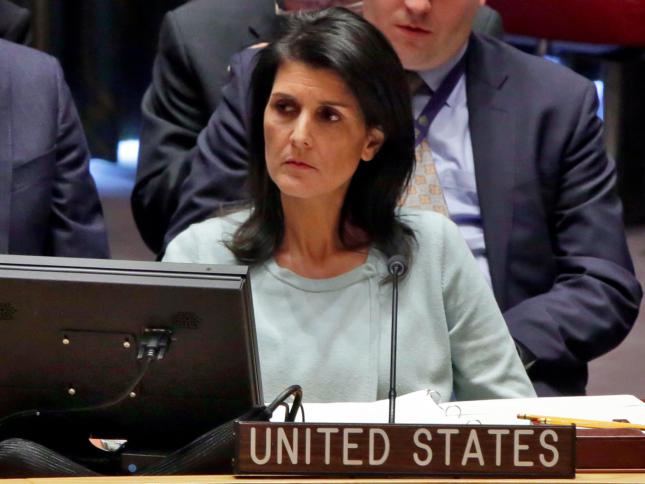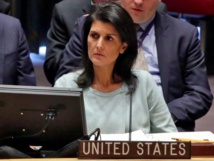In New York, the US ambassador to the United Nations Nikki Haley condemned Assad's history of human rights abuses against his own people.
But she said Washington would focus on working with powers like Turkey and Russia to seek a political settlement, rather than focusing on Assad.
"You pick and choose your battles," Haley told reporters.
"And when we're looking at this, it's about changing up priorities and our priority is no longer to sit and focus on getting Assad out."
Shortly before Haley briefed a small group of journalists, US Secretary of State Rex Tillerson sent a similar signal at a news conference in Turkey.
"I think the... longer term status of President Assad will be decided by the Syrian people," Tillerson said, standing alongside Turkish Foreign Minister Mevlut Cavusoglu.
The Syrian opposition, whose cooperation will be needed in any negotiated solution. reacted furiously to the US shift in stance.
"The opposition will never accept any role for Bashar al-Assad at any phase," said Monzer Makhos, a spokesman for the HNC, the opposition negotiating group.
"There will be no change in our position," he warned.
Under Barack Obama's administration, the US made Assad's departure a key goal, but new president Donald Trump has put the accent on defeating the Islamic State group.
Tillerson's reference to the Syrian people's decision reflected language long used by Assad's ally Russia, whose assistance Washington is courting.
"Our priority is to really look at how do we get things done? Who do we need to work with to really make a difference for the people in Syria," Haley said.
"We can't necessarily focus on Assad the way the previous administration maybe did. Do we think he's a hindrance? Yes," she said.
"Are we going to sit there and focus on getting him out? No."
US officials sought to play down the significance of the change in tone, but experts said the switch in focus was an important admission.
Joseph Bahout, of the Carnegie Endowment for International Peace in Washington noted that Tillerson had spoken after meeting Turkey's President Recep Tayyip Erdogan.
Erdogan was once a strong foe of Assad, but recently Turkish-backed rebels in Syria have focused on fighting Kurdish militias and the IS group.
Bahout said Tillerson's statement was a bit "shameful" after the years of US insistence that Assad's crimes had rendered him unfit to govern.
"The use of 'longer term' allows us to imagine that this issue is no longer on the immediate agenda," he told AFP.
"And 'decided by the Syria people' suggests that there's no longer any consideration of an international mechanism on this question," he said.
Previously, the United States has stuck by a UN-backed peace plan that would see Assad "transition" from office while an interim regime is formed.
Now, Bahout suggested, Tillerson and Haley appear not to be ruling out a Russian idea that Assad should stand for re-election in 2020.
"What's sure, in any case, is that the Russians must be pretty happy," he said.
Tillerson is due in Moscow next month for talks with Russian leaders, and Trump has long argued the powers should work together against the IS group.
US-backed forces are closing in on the jihadist Islamic State's Syrian stronghold of Raqa, laying the groundwork for an assault on the capital of their so-called "caliphate".
Tillerson's trip came the day after Turkey announced the end of "Euphrates Shield", its own six-month-old military offensive in northern Syria.
Ties between the NATO allies were strained under Obama, particularly over US cooperation with the Syrian Kurdish militia fighting against IS.
- 'Difficult choices' -
Turkey wants to join any operation to capture Raqa, but without the US-backed Kurdish YPG militia, which it regards as terrorist.
"There's no space between Turkey and the US and our commitment to defeat Daesh, to defeat ISIS," Tillerson said, using the US government's terms for IS.
"What we discussed today were options that are available to us... These are not easy decisions. There are difficult choices that have to be made," he said.
However, Cavusoglu said Ankara was still concerned about the YPG, warning: "It is not good or realistic to work with a terror group while fighting another terror group."
Numerous diplomatic efforts have failed to end the Syrian conflict, which has killed more than 320,000 people and displaced millions since it erupted in March 2011.
A fifth round of UN-sponsored peace talks is taking place in Geneva but no breakthrough has been reported and they are scheduled to end on Friday.
-------------------------------------------------------------------------------------------------------
But she said Washington would focus on working with powers like Turkey and Russia to seek a political settlement, rather than focusing on Assad.
"You pick and choose your battles," Haley told reporters.
"And when we're looking at this, it's about changing up priorities and our priority is no longer to sit and focus on getting Assad out."
Shortly before Haley briefed a small group of journalists, US Secretary of State Rex Tillerson sent a similar signal at a news conference in Turkey.
"I think the... longer term status of President Assad will be decided by the Syrian people," Tillerson said, standing alongside Turkish Foreign Minister Mevlut Cavusoglu.
The Syrian opposition, whose cooperation will be needed in any negotiated solution. reacted furiously to the US shift in stance.
"The opposition will never accept any role for Bashar al-Assad at any phase," said Monzer Makhos, a spokesman for the HNC, the opposition negotiating group.
"There will be no change in our position," he warned.
Under Barack Obama's administration, the US made Assad's departure a key goal, but new president Donald Trump has put the accent on defeating the Islamic State group.
Tillerson's reference to the Syrian people's decision reflected language long used by Assad's ally Russia, whose assistance Washington is courting.
"Our priority is to really look at how do we get things done? Who do we need to work with to really make a difference for the people in Syria," Haley said.
"We can't necessarily focus on Assad the way the previous administration maybe did. Do we think he's a hindrance? Yes," she said.
"Are we going to sit there and focus on getting him out? No."
US officials sought to play down the significance of the change in tone, but experts said the switch in focus was an important admission.
Joseph Bahout, of the Carnegie Endowment for International Peace in Washington noted that Tillerson had spoken after meeting Turkey's President Recep Tayyip Erdogan.
Erdogan was once a strong foe of Assad, but recently Turkish-backed rebels in Syria have focused on fighting Kurdish militias and the IS group.
Bahout said Tillerson's statement was a bit "shameful" after the years of US insistence that Assad's crimes had rendered him unfit to govern.
"The use of 'longer term' allows us to imagine that this issue is no longer on the immediate agenda," he told AFP.
"And 'decided by the Syria people' suggests that there's no longer any consideration of an international mechanism on this question," he said.
Previously, the United States has stuck by a UN-backed peace plan that would see Assad "transition" from office while an interim regime is formed.
Now, Bahout suggested, Tillerson and Haley appear not to be ruling out a Russian idea that Assad should stand for re-election in 2020.
"What's sure, in any case, is that the Russians must be pretty happy," he said.
Tillerson is due in Moscow next month for talks with Russian leaders, and Trump has long argued the powers should work together against the IS group.
US-backed forces are closing in on the jihadist Islamic State's Syrian stronghold of Raqa, laying the groundwork for an assault on the capital of their so-called "caliphate".
Tillerson's trip came the day after Turkey announced the end of "Euphrates Shield", its own six-month-old military offensive in northern Syria.
Ties between the NATO allies were strained under Obama, particularly over US cooperation with the Syrian Kurdish militia fighting against IS.
- 'Difficult choices' -
Turkey wants to join any operation to capture Raqa, but without the US-backed Kurdish YPG militia, which it regards as terrorist.
"There's no space between Turkey and the US and our commitment to defeat Daesh, to defeat ISIS," Tillerson said, using the US government's terms for IS.
"What we discussed today were options that are available to us... These are not easy decisions. There are difficult choices that have to be made," he said.
However, Cavusoglu said Ankara was still concerned about the YPG, warning: "It is not good or realistic to work with a terror group while fighting another terror group."
Numerous diplomatic efforts have failed to end the Syrian conflict, which has killed more than 320,000 people and displaced millions since it erupted in March 2011.
A fifth round of UN-sponsored peace talks is taking place in Geneva but no breakthrough has been reported and they are scheduled to end on Friday.
-------------------------------------------------------------------------------------------------------









 Home
Home Politics
Politics











